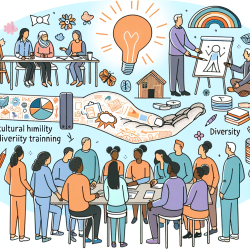Introduction
The COVID-19 pandemic has underscored the critical need for innovative health promotion strategies, particularly for vulnerable youth in low-income urban and rural communities. The study titled "Remote Implementation of a School-Based Health Promotion and Health Coaching Program in Low-Income Urban and Rural Sites: Program Impact during the COVID-19 Pandemic" provides valuable insights into how remote programs can effectively support these populations.
Program Overview
The Stanford Youth Diabetes Coaches Program (SYDCP) was adapted for remote implementation to address the challenges faced by adolescents in underserved areas. The program aimed to enhance health knowledge, patient activation, and psychosocial assets among participants. Conducted across urban and rural sites, the program demonstrated significant improvements in health outcomes despite the barriers posed by remote learning.
Key Findings
The study involved 156 students, with 100 completing both pre- and post-surveys. The results were promising:
- Health Knowledge: Participants showed significant improvements in health knowledge, which is crucial for informed health decisions.
- Patient Activation: There was a notable increase in patient activation levels, with participants moving to higher levels of engagement and self-management.
- Health Behaviors: Improvements were seen in the consumption of fruits and vegetables and stress management, although challenges remained in other areas such as physical activity.
- Psycho-Social Assets: Enhancements in self-esteem, self-efficacy, and problem-solving skills were observed, supporting the development of resilient youth.
Implications for Practitioners
For practitioners in the field of speech-language pathology and other health disciplines, this study highlights the potential of remote health promotion programs to create positive outcomes for vulnerable youth. Here are some actionable insights:
- Leverage Technology: Utilize digital platforms to reach underserved populations, ensuring that technological barriers are addressed to maximize participation.
- Focus on Engagement: Design programs that actively engage participants through interactive content and personalized coaching.
- Measure Outcomes: Implement robust evaluation methods to assess program impact and continuously refine strategies based on data-driven insights.
Encouraging Further Research
While the findings are encouraging, further research is needed to explore long-term impacts and optimize program delivery. Practitioners are encouraged to contribute to this growing body of knowledge by conducting studies in diverse settings and sharing best practices.
To read the original research paper, please follow this link: Remote Implementation of a School-Based Health Promotion and Health Coaching Program in Low-Income Urban and Rural Sites: Program Impact during the COVID-19 Pandemic.










